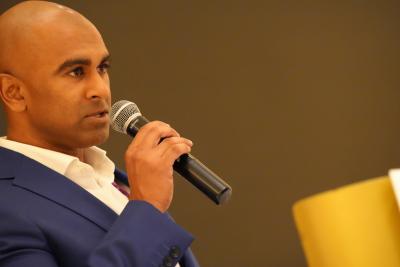Cryptocurrency, is it a viable investment opportunity for the wealth management industry?

Dec 8, 2017
Whilst there have been a number of generic articles about Cryptocurrencies and Bitcoin, we wanted to dig deeper to try to get to the bottom of whether or not cryptocurrencies are a viable investment opportunity for the wealth management industry.
Our starting point was to send out a survey which was sponsored by Leonteq Securities.
We received over 750 responses which were then collated and considered. On the day we sent the survey, the bitcoin price hovered at USD 7,500.
Taking the survey results as the starting point, we conducted a comprehensive Round Table on November 28th for professionals in the wealth management industry, including senior professionals from independent wealth management firms, private banks, crypto experts and professional services firms. Behind closed doors we unveiled some strong opinions, and some polarised views on cryptocurrencies, blockchain and the future digitalisation of exchange. On this day the bitcoin price hit a high of USD 9,921.
On Friday 8th December, bitcoin reached an all-time high of over USD 17,000, with bitcoin exchanges unable to keep up with the volumes, we are pleased to release the opinions of our crypto think tank combined with those of our survey respondents. We hope this serves to provide a rounded view of how the Asian wealth management industry currently views the evolving Cryptocurrency market at a time of significant volatility.
Survey questions:
- Do you consider Cryptocurrencies as a potential new asset class / investment opportunity?
- Would you consider investing in Bitcoin for your clients? And alternatives to bitcoin?
- Would you prefer investing directly via an exchange or via a tradable financial instrument such as a listed Tracker?
- Are you aware of the main risks and security measures when you invest in crypto?
- Is there a bubble around crypto? Or do you expect the Crypto to grow further in the future and be sustainable?
- Are you familiar with the blockchain technology?
Here are some of the highlights:
- “The financial sector is at threat. Everything with an intermediary role that does not ‘get’ the new reality risks losing wealth. You need to check out from the old world and check in into the new world.”
- “Are you an early adopter or diehard stick in the mud? It is always the same track and path we see in history.”
- “For an asset manager, being an early adopter is dangerous, as there will be too much blood on the street. But tiptoeing in might be realistic.”
- “Cryptocurrencies right now are trading tools. The theory currently is that you need to have skin in the game, but that is not to do with professional asset allocation, that is more to do with fear of missing out, testing what is happening, being curious.”
- “People raised the same thing about investing in the emerging BRICs some 10 to 15 years ago, but being in early there achieved massive returns. Coming in late can often be riskier.”
- “I would not recommend my clients invest in this asset class, however, I would not strongly object should a client decide to allocate a small portion (between 1% to 3%) of their wealth.”
- “Is what people call a bubble simply something they have no take in, or sold out of way too early?”
- “Block chain is just a few years old, the major challenge now is scalability.”
- “About eight million people roughly use bitcoin, just imagine if suddenly if 100 million, or 500 million, or 5 billion people.”
- “As a representative of a leading exchange and clearing house, I disagree that the traditional infrastructure and custodial needs will disappear overnight in the blockchain tsunami. I see this as a wonderful opportunity for us and our global colleagues and peers. For example, would an asset manager invest in crypto currencies on their own, or act with clients’ money to manage their cryptos ‘wallet’ from their office, with the hardware located there? Would they not prefer to have a trusted custodian – a leading name with a great track record to transact and manage the assets for you? I think you would.”
- The bitcoin market price was driven by ‘pure speculation’, with a ‘severely false market created by almost no (and/or manipulated) liquidity’. Another described bitcoin as a ‘high-risk commodity derivative.
- “Some maintain that bitcoin and other cryptocurrencies are the domain of criminals, drug dealers and others populating the ‘dark’ world. But remember how the mighty US dollar has played such an immense role in the global drugs industry, at one stage there was an estimate that some enormous percentage of notes in circulation had had drug industry fingers on them. But there is a genuine possibility that cryptocurrencies and blockchain identity solutions might end up as the new world of transparency and traceability.”
- “Is a bubble such a dreadful thing, or is it a means of price and value discovery?”
Are cryptocurrencies and blockchain moving mainstream?
Blockchain is the technology enabling bitcoin and the transactional revolution it promises.
Could cryptocurrencies become a mainstream asset class? Virtually all the respondents who replied directly to that question stated an emphatic ‘no’, certainly not as things stand today. But, most were confident that the blockchain technology facilitating bitcoin – and many other cryptocurrencies - would have widespread, dramatic implications for transactions in everyday life in the future.
Bitcoin is a cryptocurrency, which means it is a digital currency in which encryption techniques are used to regulate the generation of units, verify ownership and confirm the transfer of funds.
Rather than being supplied by a central bank, as normal currencies have been to date, bitcoins are created by a process known as ‘mining’, which involves solving complicated algorithmic transactions with computers. These algorithms determine the rate at which new bitcoins are created until they reach a maximum limit of 21 million units in the year 2140.
Absence of regulation causes trepidation
As bitcoin and other cryptocurrencies are not legal monetary tender issued by central banks, many respondents voiced deep-seated concerns about their viability as a financial instrument.
When asked whether they would promote cryptocurrencies to their clients as a viable – even if alternative – asset class, respondents voiced concerns about the lack of regulation, while others worry about the difficulty in understanding the instrument. Some fear that unscrupulous IT gurus could manipulate their valuation.
Bitcoin has become the benchmark cryptocurrency, although there are today an estimated 800-1200 such instruments. Bitcoin emerged in early 2009 and has by far the largest market capitalisation – a shade over USD 195 billion on December 5, based on the market price of just over USD 11,769 that day. And Bitcoin has the most units in circulation – an estimated 16.7 million units out of the maximum 21 million units that could be potentially ‘mined’.
As the market price of a bitcoin in 2010 was less than USD 1 cent it comes as little surprise that survey respondents expressed grave concerns about the immense volatility. One said that the bitcoin market price was driven by ‘pure speculation’, with a ‘severely false market created by almost no (and/or manipulated) liquidity’. Another described bitcoin as a ‘high-risk commodity derivative with no underlying’.
Some noted that there can be an infinite number of cryptocurrencies, making it even more unrealistic to consider any as a viable element in any professionally managed wealth portfolio. One did, however, concede that “for punters with elevated risk appetite it could be worth a small speculative position”, while also warning that did not qualify it as a viable investment opportunity in a professionally managed portfolio.
Real world applications for bitcoin’s blockchain technology
“Whilst businesses have started accepting cryptocurrencies, the inherent limits in the blockchain algorithm, and the self-limiting quantity of Bitcoin, will make transactions more expensive… Despite recent popularity, I would still consider it an alternative speculation - not investment.”
As blockchain is a distributed digital ledger that records transactions across numerous computers the record cannot be altered retroactively without the alteration of all subsequent blocks and the collusion of the entire network.
While this might theoretically be safe and efficient, does the average person have confidence in this form of ownership and transfer recognition? Not yet, but it was only a moment ago in time that all letters were sent through the post.
As blockchain is on open source on a public network, there is a growing belief that blockchain technology is here to stay and will make the exchange of assets much faster, more efficient, lower cost and more secure.
As understanding of it grows the list of blockchain applications - from decentralised exchanges to digital identity to digital voting to online shopping – grows apace. For each such application the security, efficiency and cost savings should, advocates of blockchain argue, all be dramatically improved.
Bitcoin could be viewed as the front-line foot soldier of the blockchain, waging a war on the financial and transactional world as we know it.
While wealth managers in Asia do not see it as a mainstream financial instrument and central banks do not see it as a real currency, there are many who want to arm bitcoin with greater weaponry. [see article ‘How to make USD 82 million from 2 pizzas’]
Intimations of immortality?
Does this all mean that cryptocurrencies will not only survive but could soon be within mainstream financial credibility?
The Guardian reported that on 19 June, the International Monetary Fund issued a staff discussion stating that banks should consider investing in cryptocurrencies, noting that the rapid advances in digital technology were transforming the financial services landscape, creating opportunities and challenges for consumers, service providers and regulators alike. And the newspaper noted that IBM had also announced a deal with seven major banks to build a digital trade platform that will run on IBM’s cloud.
Earlier this year, Japan’s authorities approved bitcoin as a legal payment.
Not all jurisdictions are so crypto positive, with Indonesia the latest country to ban bitcoin transactions, which will take effect on January 1, 2018.
In turn, does this mean that high net worth investors and other more modest participants are moving tiny proportions of their assets into digital? Yes, and even if the shift is tiny, almost invisible, this would be scores of billions of dollars or equivalent.
Bitcoin for portfolios?
However, the respondents to the Hubbis cryptocurrency survey are adamant that as conditions are currently, this is not a mainstream product they can willingly offer to private clients.
In short, the regulatory, financial and reputational risks associated with cryptocurrencies remain too great. “At most, it is a currency, at worst a bubble of epic proportions akin to tulip mania”. Some feel that the extreme volatility and less than transparent pricing of the different varieties of cryptocurrencies precludes it from being a valid asset at this stage.
Not a single respondent said they would advise clients to invest in bitcoin or alternatives.
With one of them even stating: “The difference between investment and gambling is whether we can conduct fundamental evaluation”.
However, that does not imply they are all 100% negative on Bitcoin or other cryptocurrencies. “I would not recommend my clients invest in this asset class,” said one participant, “however, I would not strongly object should a client decide to allocate a small portion (between 1% to 3%) of their wealth.” To the question of whether they would prefer investing directly via an exchange or via a tradable financial instrument such as a listed tracker, respondents were considerably more positive. One said that there “might be a place for a crypto-currency fund, so long as it was aimed at very sophisticated investors who understood the nature of the gamble”.
The consensus was that trading in the instrument or derivatives on regulated exchanges would give these currencies a wider acceptability and liquidity. Ultimately, “it is vital that transactions are visible, traceable, transparent and monitored”.
Here today, not gone tomorrow
The weight of evidence suggests that cryptocurrencies are here to stay, although many will fall by the wayside.
And blockchain technology appears set to revolutionise our systems and processes.
Opinions of the cryptocurrency think tank
Below are SOME snapshots of the discussion points arising during the think tank.
“Block chain is just a few years old, the major challenge now is scalability.”
“The key point of a distributed ledger is you have the instantaneous settlement. You can trade with each other in a ‘trustless’ way. Whether bitcoin lives or dies, rises or fall, the key point is the application of blockchain to our existing financial system.”
“With the blockchain, smart, programmable, secure money is around the corner, and banking without banks is possible. Having been in banking for more than two decades, I can say there has only been minor change, no more than a touch of paint on the same old infrastructure. But think of the history of money, its evolution to fiat currency from items used for barter, to gold, to paper backed with gold and now we have programmable money. If we as bankers do not understand how money evolves we risk our own Kodak moment. If we do not evolve in the right direction, if we fiddle while Rome is burning, then game over.”
“Blockchain is immutable due to the public ledger, but it has downsides, for example if you make a mistake, you lose your password, cannot be reset, if you send something wrongly to another you cannot take it back. Security is a huge issue but just as in the early days of the internet problems will be solved one by one. Security, privacy, and scalability – these are all hurdles and all problems that will be overcome with technology. Ergo, the explosion of crypto values has not even started. This is the new oil, which in the earliest days of drilling was simply black, smelly stuff. But it soon became money, trillions of dollars of it.”
“The financial sector is at threat. Everything with an intermediary role that does not ‘get’ the new reality risks losing wealth. You need to check out from the old world and check in into the new world.”
“If one started with a bank or an exchange today, one would get rid of perhaps even most of the current hardware and software infrastructure that supports the transactions. You no longer need an exchange, or clearing house, or clearing members, or broker dealers, custodians and so forth as clients can hold assets directly and they can exchange assets directly in a safe way in terms of instant settlement with no delay of exchange of value. The implications are dramatic.”
“Adapt or die. We believe there is in fact an immense opportunity for exchanges or banks to embrace this because they have client network, they have got the trust of clients, the brands that tell customers and regulators and the industry at large that they can be relied upon. But all this will take time and understanding as there are immense risks involved in ripping up existing infrastructure unless the institution is 100% sure of what they are replacing it with.”
“As a representative of a leading exchange and clearing house, I disagree that the traditional infrastructure and custodial needs will disappear overnight in the blockchain tsunami. I see this as a wonderful opportunity for us and our global colleagues and peers. For example, would an asset manager invest in crypto currencies on their own, or act with clients’ money to manage their cryptos ‘wallet’ from their office, with the hardware located there? Would they not prefer to have a trusted custodian – a leading name with a great track record transact and manage the assets for you? I think you would.”
“I am still convinced that we would need certain service packages in place, provided by trusted institutions and counterparties, custodians whatever the functions missing here, but it must be through ‘trust’ organisations.”
“How confident might an asset manager feel trading a block of how ever many thousand bitcoins for example? Hmmm, perhaps here also we will need trusted counterparties guaranteeing the fulfilment of the deal, not only for derivatives later but also for cash underlying business.”
“For the accounting industry we believe there are enormous opportunities to apply our skills and seal of approval through the audit, which is effectively a process of validation.”
“I believe you got to have crypto in your portfolio as it gives you optionality. At this stage invest only what you can afford to lose, but I for one believe it will go up many more times. So not to be invested is risky, while to be invested is not the risky part.”
“Many or most of the accounting firms’ clients, whether wealth clients or asset management clients, are looking at these opportunities. There is an awful lot of movement and we are getting an institutionalisation of this, there is a much stronger dialogue with all the key parties, the buy side, the sell side, the regulators, the big four, the lawyers, the banks, exchanges, all beginning to talk about this and to work out how to work together.”
“For the legal industry there are also vast implications and opportunities, as this new world impacts almost every sphere of the financial and transactional world, from property to collectibles to cars to pensions, airlines and almost every conceivable area of human activity.”
“The regulatory environment around cryptocurrencies is likely to become dramatically tougher, with regulators trying to chase their tails by becoming excessively tough. Governments and regulators do not want to lose control.”
“Will blockchain be the death of control by governments, or the birth of absolute control?”
“Currency is simply a protocol for exchanging value. Bitcoin is digital money. But what is money? Money is no more than the collective hallucination of perceived value.”
“All the major global accounting firms are now conducting controls reviews, working with government to investigate cryptos, blockchain and so forth, in order to provide that level of understanding and security.”
“I have great concerns and questions. What is this thing that you are trying to own? What is the yield that comes out of something that you think you own? What is the real liquidity behind it? How do you integrate it into your existing portfolio? How do you manage the risk of losses? How to make it tax efficient, compliant? How do you know that you can hold it actually? Who can actually make it work for you?”
“There are many issues to understanding what one might be investing in. For example, how can investments be professionally audited, or is security the barrier?”
“It is too early to look at cryptocurrency as an asset class, it has enormous amount of potential. But do not look at it as a currency, as a currency is backed by a government, which is in turn backed by its revenues or by something solid.”
“To see cryptos as commodities makes more sense, because you have supply, you have demand, you have location premiums, you have a lot of different dynamics to it and it is easier to value it. And CBOE and CME launching bitcoin futures contracts will give these ‘commodities’ points of reference via the futures contracts.”
“Is a crypto perhaps more of a commodity than a currency? The utilitarian value of bitcoin, for example, is still extremely limited.”
“A central tenet of many of the more classic financial sector intermediaries is that a so much of the money into crypto has been going to unregulated exchange. How do we make this more bankable, how do we securitise it, look after the client assets, list the products on a proper, regulated exchange, denominate them in Dollars, Swiss francs, Euros, and even launch hedging products to mitigate short term price volatility.”
“I feel that we are building a bubble because when something moves up by 18% down by 30% and nobody knows how to assess any sort of fair value by any yardsticks we probably have a bubble in the making.”
“Cryptocurrencies right now are trading tools. The theory currently is that you need to have skin in the game, but that is not to do with professional asset allocation, that is more to do with fear of missing out, testing what is happening, being curious.”
“We have recently filed a fully regulated fund investing in what is basically a basket of cryptos, audited by a major global accounting firm. This is an upcoming asset class but so-called ‘ownership’, settlement and custody issues are major barriers to entry, so indirect ownership through a classic type of fund is ideal for most people who do not necessarily want or trust the complexity of owning the asset directly. These same people are far more comfortable having a bank account than having a bitcoin wallet because they are not confident enough to have their own private keys. So, we believe for the financial industry that is probably far more an opportunity rather than a threat.”
“Are you an early adopter or diehard stick in the mud? It is always the same track and path we see in history.”
“For an asset manager, being an early adopter is dangerous, as there will be too much blood on the street. But tiptoeing in might be realistic.”
“People raised the same thing about investing in the emerging BRICs some 10 to 15 years ago, but being in early there achieved massive returns. Coming in late can often be riskier.”
“Is a bubble such a dreadful thing, or is it a means of price and value discovery? For example, Amazon stock soared to great heights and then crashed before Amazon has emerged from its nuclear winter and has come out the other side dramatically stronger. In bubbles and corrections, the good, bad and the ugly get separated and then the best usually continue their ascent.”
“Is what people call a bubble simply something they have no stake in, or sold out of way too early?”
“Some maintain that bitcoin and other cryptocurrencies are the domain of criminals, drug dealers and others populating the ‘dark’ world. But remember how the mighty US dollar has played such an immense role in the global drugs industry, at one stage there was a estimate that some enormous percentage of notes in circulation had had drug industry fingers on them. But there is a genuine possibility that cryptocurrencies and blockchain identity solutions might end up as the new world of transparency and traceability.”
“About eight million people roughly use bitcoin, just imagine if suddenly if 100 million, or 500 million, or 5 billion people.”
“Is the biggest bubble not the global Central Bank bubble, $25 trillion of bonds earning less than 1% and with interest rates now beginning to rise again?”
“Tokenisation is another important development. We now have just a few digital tokens but eventually everything from digital assets to air miles to gold, real estate, whatever, will be connected to the block chain. So, you can imagine an asset manager of tomorrow will have millions, billions of tokens, valid tokens on the blockchain to be managed in a digital native environment.”
“We understand the Singapore government is working on bringing the Singapore dollar on the block chain, so in that process fiat money will become tokenised.”
“We need to also draw a line between cryptocurrencies and tokens. Initial Coin Offerings, or ICOs are a dramatic new phenomenon amongst the world of fund raising. But there have been some landmark legal cases against them, for example in the case of Tevos. Cryptos become adopted and that is a different value proposition from a new token issued by an entrepreneur programmer on a ‘promise’ – mostly undelivered so far - of delivering software.”
“ICOs have exploded since the beginning of this year. Think about the ICOs as basically programmers who suddenly have access to funding and do not need to go through VCs. These programmers may have nothing more than a white paper - or shall I call it a wish paper – and then they suddenly have money from a few million to a few hundred million. It is just amazing because people throw money at them. But watch out because the regulators, smart or slow, are all starting to look into this essentially utterly unregulated market.”
“Do ICOs really have appropriately structured and managed foundations behind them? Compliant entities? Do the investors ever get anything back, other than some nebulous feeling of having contributed to a noble cause? There are numerous questions over ICOs, but that has not stopped their proliferation during 2017.”







